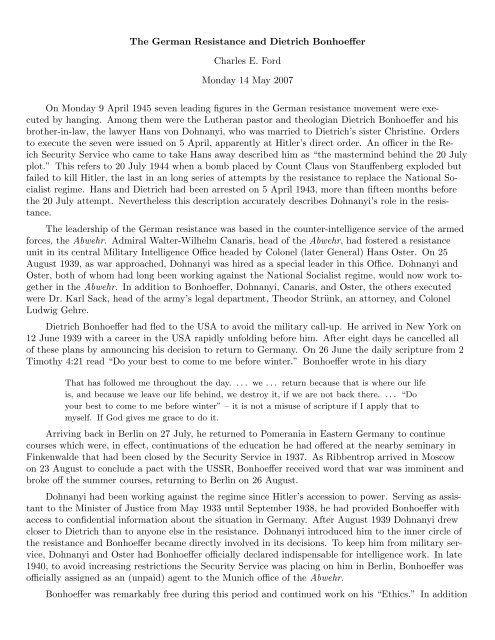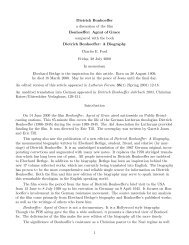The German Resistance and Dietrich Bonhoeffer - Christ and the ...
The German Resistance and Dietrich Bonhoeffer - Christ and the ...
The German Resistance and Dietrich Bonhoeffer - Christ and the ...
Create successful ePaper yourself
Turn your PDF publications into a flip-book with our unique Google optimized e-Paper software.
<strong>The</strong> <strong>German</strong> <strong>Resistance</strong> <strong>and</strong> <strong>Dietrich</strong> <strong>Bonhoeffer</strong><br />
Charles E. Ford<br />
Monday 14 May 2007<br />
On Monday 9 April 1945 seven leading figures in <strong>the</strong> <strong>German</strong> resistance movement were executed<br />
by hanging. Among <strong>the</strong>m were <strong>the</strong> Lu<strong>the</strong>ran pastor <strong>and</strong> <strong>the</strong>ologian <strong>Dietrich</strong> <strong>Bonhoeffer</strong> <strong>and</strong> his<br />
bro<strong>the</strong>r-in-law, <strong>the</strong> lawyer Hans von Dohnanyi, who was married to <strong>Dietrich</strong>’s sister <strong>Christ</strong>ine. Orders<br />
to execute <strong>the</strong> seven were issued on 5 April, apparently at Hitler’s direct order. An officer in <strong>the</strong> Reich<br />
Security Service who came to take Hans away described him as “<strong>the</strong> mastermind behind <strong>the</strong> 20 July<br />
plot.” This refers to 20 July 1944 when a bomb placed by Count Claus von Stauffenberg exploded but<br />
failed to kill Hitler, <strong>the</strong> last in an long series of attempts by <strong>the</strong> resistance to replace <strong>the</strong> National Socialist<br />
regime. Hans <strong>and</strong> <strong>Dietrich</strong> had been arrested on 5 April 1943, more than fifteen months before<br />
<strong>the</strong> 20 July attempt. Never<strong>the</strong>less this description accurately describes Dohnanyi’s role in <strong>the</strong> resistance.<br />
<strong>The</strong> leadership of <strong>the</strong> <strong>German</strong> resistance was based in <strong>the</strong> counter-intelligence service of <strong>the</strong> armed<br />
forces, <strong>the</strong> Abwehr. Admiral Walter-Wilhelm Canaris, head of <strong>the</strong> Abwehr, had fostered a resistance<br />
unit in its central Military Intelligence Office headed by Colonel (later General) Hans Oster. On 25<br />
August 1939, as war approached, Dohnanyi was hired as a special leader in this Office. Dohnanyi <strong>and</strong><br />
Oster, both of whom had long been working against <strong>the</strong> National Socialist regime, would now work toge<strong>the</strong>r<br />
in <strong>the</strong> Abwehr. In addition to <strong>Bonhoeffer</strong>, Dohnanyi, Canaris, <strong>and</strong> Oster, <strong>the</strong> o<strong>the</strong>rs executed<br />
were Dr. Karl Sack, head of <strong>the</strong> army’s legal department, <strong>The</strong>odor Strünk, an attorney, <strong>and</strong> Colonel<br />
Ludwig Gehre.<br />
<strong>Dietrich</strong> <strong>Bonhoeffer</strong> had fled to <strong>the</strong> USA to avoid <strong>the</strong> military call-up. He arrived in New York on<br />
12 June 1939 with a career in <strong>the</strong> USA rapidly unfolding before him. After eight days he cancelled all<br />
of <strong>the</strong>se plans by announcing his decision to return to <strong>German</strong>y. On 26 June <strong>the</strong> daily scripture from 2<br />
Timothy 4:21 read “Do your best to come to me before winter.” <strong>Bonhoeffer</strong> wrote in his diary<br />
That has followed me throughout <strong>the</strong> day. . . . we . . . return because that is where our life<br />
is, <strong>and</strong> because we leave our life behind, we destroy it, if we are not back <strong>the</strong>re. . . . “Do<br />
your best to come to me before winter” – it is not a misuse of scripture if I apply that to<br />
myself. If God gives me grace to do it.<br />
Arriving back in Berlin on 27 July, he returned to Pomerania in Eastern <strong>German</strong>y to continue<br />
courses which were, in effect, continuations of <strong>the</strong> education he had offered at <strong>the</strong> nearby seminary in<br />
Finkenwalde that had been closed by <strong>the</strong> Security Service in 1937. As Ribbentrop arrived in Moscow<br />
on 23 August to conclude a pact with <strong>the</strong> USSR, <strong>Bonhoeffer</strong> received word that war was imminent <strong>and</strong><br />
broke off <strong>the</strong> summer courses, returning to Berlin on 26 August.<br />
Dohnanyi had been working against <strong>the</strong> regime since Hitler’s accession to power. Serving as assistant<br />
to <strong>the</strong> Minister of Justice from May 1933 until September 1938, he had provided <strong>Bonhoeffer</strong> with<br />
access to confidential information about <strong>the</strong> situation in <strong>German</strong>y. After August 1939 Dohnanyi drew<br />
closer to <strong>Dietrich</strong> than to anyone else in <strong>the</strong> resistance. Dohnanyi introduced him to <strong>the</strong> inner circle of<br />
<strong>the</strong> resistance <strong>and</strong> <strong>Bonhoeffer</strong> became directly involved in its decisions. To keep him from military service,<br />
Dohnanyi <strong>and</strong> Oster had <strong>Bonhoeffer</strong> officially declared indispensable for intelligence work. In late<br />
1940, to avoid increasing restrictions <strong>the</strong> Security Service was placing on him in Berlin, <strong>Bonhoeffer</strong> was<br />
officially assigned as an (unpaid) agent to <strong>the</strong> Munich office of <strong>the</strong> Abwehr.<br />
<strong>Bonhoeffer</strong> was remarkably free during this period <strong>and</strong> continued work on his “Ethics.” In addition
to being <strong>the</strong> culmination of his <strong>the</strong>ological efforts, it also addresses issues relevant to National Socialism<br />
<strong>and</strong> <strong>the</strong> resistance. He described, as “one of most astonishing experiences,” how leading resistance<br />
figures, who had been, until recently, far from <strong>the</strong> Church, “had now, suddenly <strong>and</strong> surprisingly, come<br />
very near indeed to <strong>the</strong> <strong>Christ</strong>ian st<strong>and</strong>point.” This is a description of people like Hans von Dohnanyi,<br />
as well as o<strong>the</strong>r members of <strong>Dietrich</strong>’s family, his bro<strong>the</strong>r Klaus, <strong>and</strong> his bro<strong>the</strong>r-in law Rüdiger Schleicher,<br />
both of whom were executed on 23 April 1945 for <strong>the</strong>ir involvement in <strong>the</strong> resistance.<br />
Although raised in a nominal <strong>Christ</strong>ian environment, such people had come to regard <strong>the</strong> Church<br />
as, at best, irrelevant, if not actually hostile to <strong>the</strong> liberal values <strong>the</strong>y espoused. <strong>The</strong>n came National<br />
Socialism. “<strong>The</strong> Children of <strong>the</strong> Church, who had become independent <strong>and</strong> gone <strong>the</strong>ir own ways, now<br />
in <strong>the</strong> hour of danger returned to <strong>the</strong>ir mo<strong>the</strong>r.” <strong>Bonhoeffer</strong> became central to <strong>the</strong>m because of <strong>the</strong> One<br />
who was central to him. “It is an experience of our days that <strong>the</strong> spoken name of Jesus alone exercises<br />
an unforeseen power.” He spoke of “all those who in <strong>the</strong>ir struggle for justice, truth, humanity <strong>and</strong> freedom<br />
have learnt once again to speak <strong>the</strong> name of Jesus <strong>Christ</strong>, even though it is often with hesitation<br />
<strong>and</strong> with genuine fear.”<br />
<strong>Bonhoeffer</strong> possessed, as his biographer has written, “an unusual capacity to help o<strong>the</strong>r people<br />
arrive at decisions.” He enabled resistance leaders to make decisions on <strong>the</strong> issues <strong>the</strong>y faced. It is this,<br />
toge<strong>the</strong>r with his powerful <strong>the</strong>ological perspective, that made <strong>Bonhoeffer</strong> central to <strong>the</strong> resistance. As<br />
he advanced more deeply into <strong>the</strong> resistance, he drew closer to <strong>the</strong> <strong>the</strong>ology <strong>and</strong> life of Martin Lu<strong>the</strong>r.<br />
This is evident in his discussion of vocation “which has come to be of almost unique significance for <strong>the</strong><br />
history of ethics.” <strong>Bonhoeffer</strong> emphasized <strong>the</strong> two sided nature of vocation or calling.<br />
<strong>The</strong> calling, in <strong>the</strong> New Testament sense, is never a sanctioning of worldly institutions as<br />
such; its “yes” to <strong>the</strong>m always includes at <strong>the</strong> same time an extremely emphatic “no,”<br />
an extremely sharp protest against <strong>the</strong> world. Lu<strong>the</strong>r’s return from <strong>the</strong> monastery to <strong>the</strong><br />
world, to <strong>the</strong> “calling,” is, in <strong>the</strong> true New Testament sense, <strong>the</strong> fiercest attack <strong>and</strong> assault<br />
to be launched against <strong>the</strong> world since primitive <strong>Christ</strong>ianity. Now a man takes up his position<br />
against <strong>the</strong> world in <strong>the</strong> world, <strong>the</strong> calling is <strong>the</strong> place at which <strong>the</strong> call of <strong>Christ</strong> is<br />
answered, <strong>the</strong> place at which a man lives responsibly.<br />
As Lu<strong>the</strong>r gave up <strong>the</strong> structured life of <strong>the</strong> monastery to plunge in <strong>the</strong> to <strong>the</strong> uncharted world of<br />
religious reform, so <strong>Bonhoeffer</strong> gave up <strong>the</strong> life of church <strong>the</strong>ologian to plunge into <strong>the</strong> uncharted world<br />
of political resistance. By <strong>the</strong> spring of 1944, after a year in prison, he was awaiting with great anticipation<br />
<strong>the</strong> coming attempt to replace <strong>the</strong> National Socialist regime. <strong>The</strong> failure of this attempt on 20<br />
July 1944 did not deter him. He affirmed <strong>the</strong> path he had chosen in a letter written <strong>the</strong> following day.<br />
During <strong>the</strong> last year or so I’ve come to know <strong>and</strong> underst<strong>and</strong> more <strong>and</strong> more <strong>the</strong> profound<br />
this-worldliness of <strong>Christ</strong>ianity. . . . By this-worldliness I mean living unreservedly in<br />
life’s duties, problems, successes <strong>and</strong> failures, experiences <strong>and</strong> perplexities. In so doing we<br />
throw ourselves completely into <strong>the</strong> arms of God, taking seriously not our own sufferings<br />
but those of God in <strong>the</strong> world – watching with <strong>Christ</strong> in Gethsemane.<br />
I think Lu<strong>the</strong>r lived a this-worldly life in this sense.



